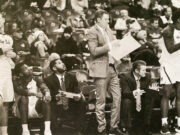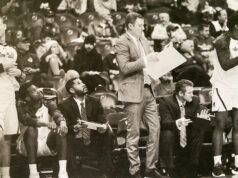Interviewed and Written by Margaret Wilkins
Terrell Coburn became the first African American head coach in program history ahead of the 2021-22 season. Before being named head coach, Coburn was an assistant coach on Grymes Hill for five seasons. Coburn began his coaching journey as a graduate assistant before moving into a director of player development role at his alma mater, the University of Central Arkansas. In his two seasons with the Sugar Bears, the team went a combined 42-22, while qualifying for the Women’s Basketball Invitational (WBI) in 2011. Before accepting the assistant coaching position at Wagner, Coburn was on the sidelines as an assistant at ASA College in Downtown Brooklyn. He helped guide the Avengers to a 22.4 record in 2015-16. ASA reached the Elite Eight of the NJCAA National tournament that season. In his first season as head coach, Coburn earned his first victory in his first-ever game as a head coach on November 9, 2021, at NJIT. Coburn also led Wagner to one of the biggest wins in program history, defeating St. John’s 62-59 at the Spiro Sports Center on December 12, 2021.
The Interview
Margaret: What do you love most about coaching women’s basketball?
Coach Coburn: I love being of service to young people in a positive way and helping them grow from a leadership standpoint. Basketball teaches discipline, commitment, and working as a team. I love helping them achieve their goals on and off the court.
Margaret: What drew you to coaching college athletics?
Coach Coburn: I love how the game of basketball can help and teach you strong values that can be correlated to your everyday life. The idea of going to college, figuring out what you want out of life, and figuring out your purpose in life are huge when you are experiencing college. Coaching in college allows me to guide student-athletes toward achieving their goals.
Margaret: What is your coaching philosophy?
Coach Coburn: The power of a lot of little things done well. The mission of my basketball program is to prepare young women by instilling the values of fundamentals set for by this great game. The basketball game has multiple ways of teaching you life-long skills that correlate on and off the court. As challenges approach, my mission is to prepare, continue to do the “little things”, and focus on our goal of winning. My basketball program will challenge its student-athletes to excel in the classroom, community, personal lives, and on the basketball court. Our goal is to help create impactful young women, who are all well-rounded individuals; our student-athletes will develop the skills necessary to succeed in any avenue they pursue after completing their education.
Margaret: What mental approaches do you use to explain your coaching success at the college collegiate level?
Coach Coburn: I have a mentality of service to you people, and it allows me to use my gifts to instill confidence and help them create good habits for success on and off the court.
Margaret: How do you mentally prepare for a game, and how do you prepare your players for a game?
Coach Coburn: I watch many films to devise schemes offensively and defensively to give our girls the best chance to win, and I meditate to calm my mind so I can be extremely sharp. Preparation is key for me, so I like calming music to prepare myself. Our players are given a lot of material to prepare them for the game (personnel tendencies, opponent schemes, and we provide the material in different ways). Our players also do breathing techniques, meditation, and positive affirmations/self-talk before the game to help them mentally.
Margaret: Explain how an excellent mental perspective has helped your players’ athletic performance individually? Collectively?
Coach Coburn: We always talk to our group about being in the moment and being what you want to become. We have a lot of affirmations in our locker room and say we affirm to our group to help them see what they want and receive it by embracing the process.
Margaret: Please give one example of how you use your mind to improve your coaching performance.
Coach Coburn: I replay actions and schemes in my head based on the opponents’ tendencies and implement them in our practices to help our girls find the best way to win the game.
Margaret: After a loss, do you ever find yourself doubting certain calls you made in the game? If so, does this affect your thoughts of your own coaching philosophy?
Coach Coburn: I have high standards for myself, so I analyze the film thoroughly and grade myself. I have a certain way I want to coach and dictate the game, so I always critique myself hard. Even if we execute the game plan, my mindset is always, “How can I do better?”














